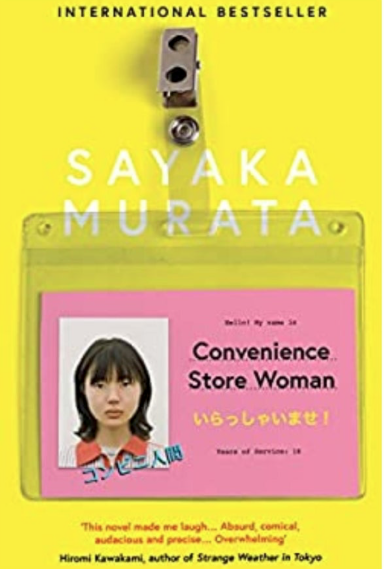
Just like last year, my first, but hopefully not last, review of the year is a contribution to Bellezza’s Japanese Literature Challenge 17.
I mentioned it last year too, I’m always looking forward to Bellezza’s event. The only difference this year – I had no clue what to pick. My Japanese TBR has grown a lot during the last couple of years and I simply had too many choices. I finally picked Convenience Store Woman because it was the one, I’ve seen reviewed the most in the last couple of months and I wanted to find out whether it really was that good.
The first-person narrator, Keiko Furukuma is a 36-year-old woman who has been working at a convenience store since she turned eighteen. She is someone who never fit in. She doesn’t understand the rules and expectations of society which leaves her confused and unmoored. The day she discovers the convenience store and starts to work there, everything changes. She loves the store, loves working at the store, loves the store’s workings, and has almost literally become a part of the store. It has entered her body and mind. And it makes her happy when it works flawlessly. The beautiful machine her life has become thanks to her dedication to the store, stops abruptly when her sister and old friends start to ask repeatedly why she’s still doing the kind of work that normally students or housewives do part time. Keiko doesn’t really know how to be a real person, as she says, but she is aware that her family and friends do not accept her way of life. To keep them off her back, she lies about her health. If she had a husband, then maybe, they would leave her be. So maybe she should look for a husband? Too bad that she’s not really interested in men. This is a very short book, so I’m not going to add much more about the story.
The book focuses very much on the present but there are a few stories from Keiko’s past which show us that she really is rather peculiar. As a small child, they find a dead bird on a playground and while all the other children cry, Keiko wants to take it home and eat it. There are also small instances of violence. Maybe this wouldn’t be so peculiar if Keiko were able to understand that some things that she did aren’t acceptable, but she doesn’t. Japanese literature is full of quirky characters and most of the time I find them endearing. Not Keiko though.
I found this book very interesting and thought-provoking. I know many readers read it as a piece of feminist fiction, but I feel it’s more than that. In the book, men who are like Keiko face the same pressures. There might be less pressure to get married and have children but the expectations to get a “real job” might be even greater.
It is never said, but while reading this book one gets the impression that Keiko is neurodivergent. That means, there’s even more societal pressure because anything she might do or say alienates people. She knows this but she doesn’t know why and not how to be different. The people around her think she must be unhappy with her life but the only thing that makes her unhappy is their pressure. The way she describes work at the shop made me think of those monks who rake Zen gardens to perfection. Making them look tidy and neat is a meditative endeavour. Keiko’s efforts to keep everything clean, tidy, and running smoothly, is more obsessive than meditative but there is a similar satisfaction in a job well done. I loved reading about the shop, about the way weather and seasons affect sales and many of the other things that are important like how to promote certain foods or display goods in an advantageous way.
What I liked most about the book is how it shows us the arrogance of society in general towards those who do these kinds of tasks. Some people enjoy this kind of work very much and that should count for something, but it doesn’t. Maybe the pressures are a bit extremer in Japan, but Western society also judges people who don’t want to have a career or a family. We still have a long way to go to accept diversity in lifestyle.

